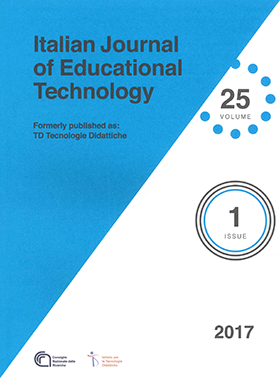Coinvolgere i giovani a rischio con l’apprendimento auto-diretto
Contenuto principale dell'articolo
Abstract
In Europa, il considerevole numero di giovani sprovvisti di qualifiche formali sta destando notevole preoccupazione a causa delle possibili conseguenze individuali, economiche e sociali. L’afflusso di giovani immigrati in Europa rende il problema ancor più pressante. Al fine di evitare l’esclusione sociale, la disoccupazione giovanile e garantire il progresso economico, l’Unione Europea e i governi delle sue nazioni offrono a questi giovani una varietà di opportunità di istruzione/educative. Gli approcci fin qui adottati non hanno dato esito positivo e per questa ragione ne è stato sviluppato uno alternativo, che sembra meglio affrontare gli aspetti critici del tradizionale modo di operare. Questo approccio è caratterizzato da una particolare attenzione all’iniziativa e all’identità dello studente, e offre ai giovani studenti a rischio una esperienza di apprendimento differente, più intrinsecamente motivante. L’approccio in esame è stato adottato in 12 sperimentazioni pilota, in sei differenti paesi europei, coinvolgendo diversi giovani migranti provenienti da differenti parti del mondo. Il risultato principale qui presentato è un quadro progettuale completo, sviluppato sulla base di una analisi incrociata dei casi. Il quadro include i principi di progettazione in materia di organizzazione, così come i criteri pedagogici da impiegarsi con i giovani a rischio.
Dettagli dell'articolo
Fascicolo
Sezione
Articoli - Numero speciale
Gli autori che pubblicano su questa rivista accettano le seguenti condizioni:
- Gli autori mantengono i diritti sulla loro opera e cedono alla rivista il diritto di prima pubblicazione dell'opera, contemporaneamente licenziata sotto una Licenza Creative Commons CC BY 4.0 Attribution 4.0 International License.
- Gli autori possono aderire ad altri accordi di licenza non esclusiva per la distribuzione della versione dell'opera pubblicata (es. depositarla in un archivio istituzionale o pubblicarla in una monografia), a patto di indicare che la prima pubblicazione è avvenuta su questa rivista.
- Gli autori possono diffondere la loro opera online (es. in repository istituzionali o nel loro sito web) prima e durante il processo di submission, poiché può portare a scambi produttivi e aumentare le citazioni dell'opera pubblicata (Vedi The effect of Open Access).

